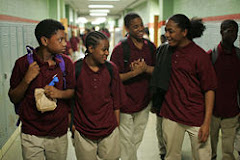The kids took to today's lesson pretty well, and I think it worked just fine. Lots of good discussion in the groups, several little skills honed, even a last-minute mini-lesson on Cornell Notes I threw in there. However, the timing was off. It's an interesting teaching exercise to teach within in isolated lessons, unable to say to myself, "Oh, we can finish that tomorrow." As a teacher, my larger strength is my unit plans rather than the individual lesson plans. Teaching a fairly isolated 60-minute lesson to kids I may or may not be teaching for the school year is a useful exercise for me, because it makes me go at a rather rapid pace, something I'm not exactly known for in the classroom. I'm just rarely in a rush to do anything, whether it's teaching or in life, and tend to focus heavily on whether the kids are getting it rather than whether I'm getting through what I need to get through. That's not a bad thing - it's better to focus on the kids getting it than moving on just because I'm trying to cover "content" - but we all need balance, and this teaching exercise of isolated lessons (and no homework) offers that.
*****
Teachers don't get our class lists until August 19th. In addition, while a few of my colleagues have received their schedules in the mail, I have not. Every day, I anxiously open the mailbox hoping that my schedule is in there. It hasn't been, yet.
However, the students have started receiving theirs. So over the last few days, a steady stream of kids have approached me and told me they have me as their teacher. I don't know them that well, but I know them a bit, so every time it happens it gets me a little excited. It also offers a kind of interesting back-piecing of my schedule together. For example, I know I teach 1st and 2nd period, and 10th period, and 6/7th period. That leaves 8/9th period, which I think will probably be my class of IB Juniors, and 3rd, 4th, and 5th periods, which are split periods and will probably be my planning time. That's slightly different from last year, which is a good thing, because I like a little variety; I'm teaching the same classes as last yer so I need to find it whatever way I can.
I admit I'm getting pretty excited about the start of the school year. The wax on the second floor should be dry by tomorrow, and I hope to start getting up there and setting up my classroom!
Resep Masakan
11 years ago

3 comments:
I have never heard of Cornell Notes before this! How did you hear about it? Is that a common practice at your school, or just something you recommend to your students only? Do you ask them to use the system in-class, in homework reading, or both? Do your students find it really helpful? I would love to have good system to recommend to my own ninth graders.
Jackie:
Did you google it after I wrote about it? Because you seem to know what it is.
I will admit that sometimes it gets clunky, but I don't often lecture and have kids take notes. The Biology and History teachers swear by it. I use it when I do the lecture thing on those rare occasions.
I think I first heard of it through the AVID (Advancement Via Individual Determination) program. You can use it in class, as well as for reading. The key is that it requires active participation with the information, as well as going back over the notes. That's why it works.
Yeah, I Googled it right after I saw it, before I wrote that comment. Sorry if that was confusing.
I begin each unit with a lecture, but I thought it might be handy for independent reading too, in conjunction with annotating the text. Thanks for the info.
Post a Comment